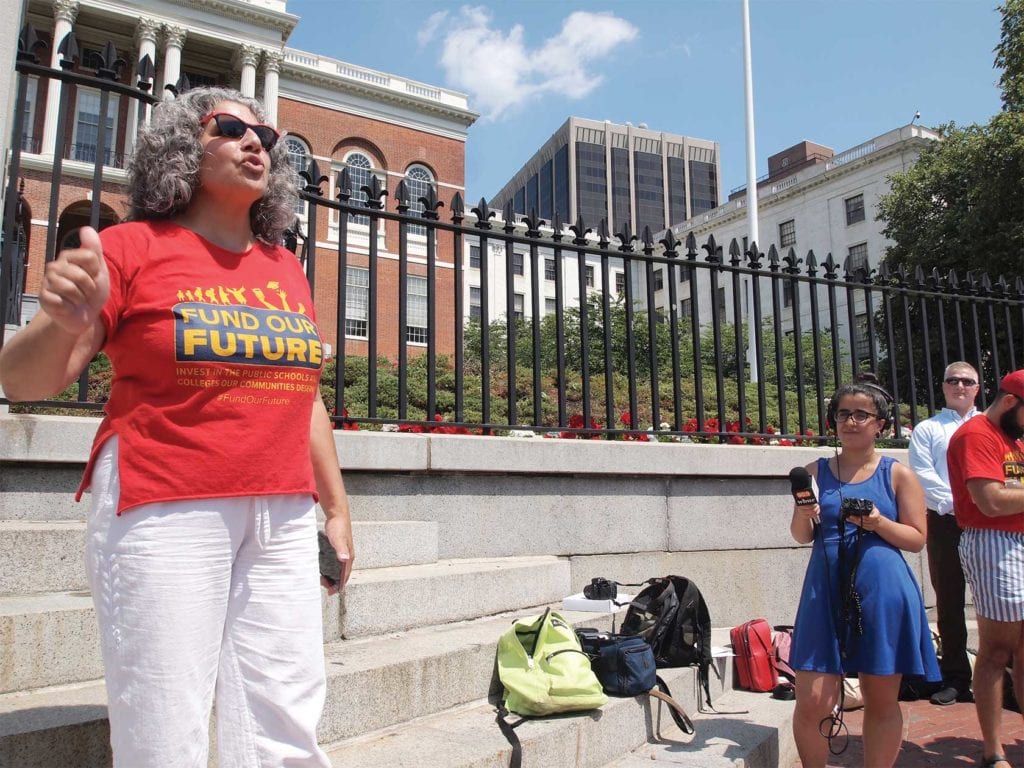Legislature passes on education funding reforms
Lawmakers on recess, may take up funding bill in fall

Massachusetts Legislators ended their session last week without resolution on education funding reform, leaving on the table questions about how the state’s low-resource districts will be funded and what powers the state will have to intervene in schools and districts deemed underperforming.
“It’s been nearly a decade-long struggle,” said Charlotte Kelly, who heads the Massachusetts Education Justice Alliance. “We know what policies need to pass. We know what kids need. It’s a question of political courage. Do they have the courage to invest in black and brown kids or not?”
The Legislature in July passed a $268 million funding increase for K-12 education, state Sen. Sonia Chang-Diaz likened to a down payment on funding reform.
Public education in Massachusetts cities and towns is funded through a combination of local and state revenues, using a formula that was established by the Education Reform Act of 1993. Each town is given a foundation budget, a bare minimum of per-pupil funding that is determined in part by the demographics of the district, including how many English language learners, low-income students and students with disabilities are enrolled in the local school system.
In 2015, the Legislature’s Foundation Budget Review Commission found that the 1993 funding formula does not adequately compensate cities and towns for those populations and has not kept pace with the rapidly rising costs of health care for school staff. The commission estimated that the state has been underfunding education by between $1 billion and $2 billion a year.
State Sen. Sonia Chang-Diaz, a Jamaica Plain Democrat, sponsored the Promise Act, a bill that would increase education funding by $1.4 billion, phased in over seven years. While the bill passed the Senate, it stalled in the House.
On Twitter last week, Chang-Diaz called this year’s $268 million increase a “down payment” on the Promise Act, adding, “But that doesn’t erase the fact that, 4 years since the FBRC roadmap, we have not gotten the job done yet on a durable solution to our nation-leading education disparities.”
American Federation of Teachers Massachusetts President Beth Kontos, too, said she was optimistic about this year’s funding increase.
“I’m hopeful it’s a reflection of the mindset of senators and representatives.”
Education activists who turned out for a July 31 demonstration in front of the State House expressed a similar mixture of disappointment and optimism.
Ruby Reyes, executive director of the Boston Education Justice Alliance, noted that the loss of state education funding in Boston has contributed to deep cuts to the city’s school budgets.
“Boston schools have lost paraprofessionals, parent engagement facilitators and other critical staff,” she said. “Principals shouldn’t have the burden cutting staff to make numbers work. Principals should be able to have budgets based on what they need.”
Boston Teachers Union organizer Arial Branz said students with learning disabilities are shortchanged because many of the classrooms in which they’re learning are understaffed.
“Right now we have teachers with general education licenses, special education licenses and English as a second language licenses, and the district is treating them as three people,” she said. “The inclusion model that works is a regular education teacher and special education teacher, so inclusion students get the education they need while the general education students get what they need.”
State reimbursements for budget dollars lost to charter schools have been underpaid for several years, adding to the loss of funding in Boston, Reyes added.
Kontos said that members of her teachers union will be pressuring legislators when they return from their August recess.
“We are asking our members to call their representatives, senators and leadership to support the Promise and Cherish Acts,” she said, referring to both Chang-Diaz’s K-12 bill and another that would increase public higher education funding.







